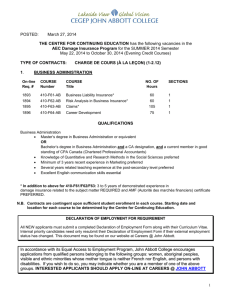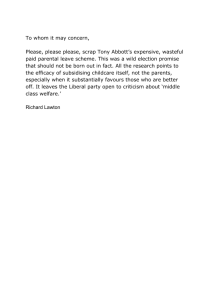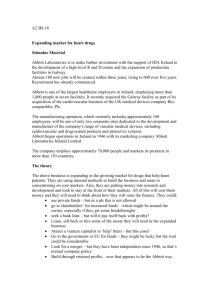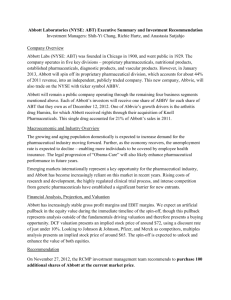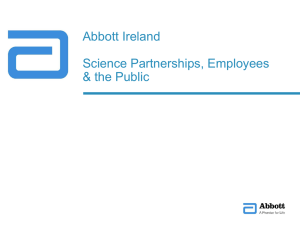report on train the trainer programme on pbl&pi conducted at
advertisement
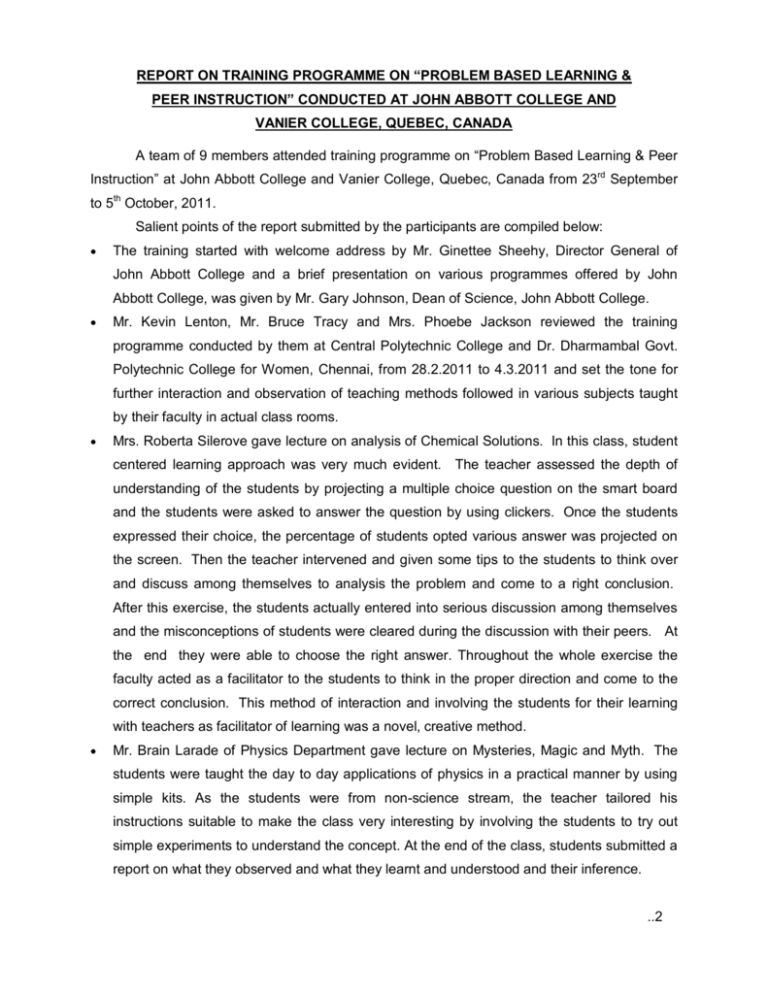
REPORT ON TRAINING PROGRAMME ON “PROBLEM BASED LEARNING & PEER INSTRUCTION” CONDUCTED AT JOHN ABBOTT COLLEGE AND VANIER COLLEGE, QUEBEC, CANADA A team of 9 members attended training programme on “Problem Based Learning & Peer Instruction” at John Abbott College and Vanier College, Quebec, Canada from 23rd September to 5th October, 2011. Salient points of the report submitted by the participants are compiled below: The training started with welcome address by Mr. Ginettee Sheehy, Director General of John Abbott College and a brief presentation on various programmes offered by John Abbott College, was given by Mr. Gary Johnson, Dean of Science, John Abbott College. Mr. Kevin Lenton, Mr. Bruce Tracy and Mrs. Phoebe Jackson reviewed the training programme conducted by them at Central Polytechnic College and Dr. Dharmambal Govt. Polytechnic College for Women, Chennai, from 28.2.2011 to 4.3.2011 and set the tone for further interaction and observation of teaching methods followed in various subjects taught by their faculty in actual class rooms. Mrs. Roberta Silerove gave lecture on analysis of Chemical Solutions. In this class, student centered learning approach was very much evident. The teacher assessed the depth of understanding of the students by projecting a multiple choice question on the smart board and the students were asked to answer the question by using clickers. Once the students expressed their choice, the percentage of students opted various answer was projected on the screen. Then the teacher intervened and given some tips to the students to think over and discuss among themselves to analysis the problem and come to a right conclusion. After this exercise, the students actually entered into serious discussion among themselves and the misconceptions of students were cleared during the discussion with their peers. At the end they were able to choose the right answer. Throughout the whole exercise the faculty acted as a facilitator to the students to think in the proper direction and come to the correct conclusion. This method of interaction and involving the students for their learning with teachers as facilitator of learning was a novel, creative method. Mr. Brain Larade of Physics Department gave lecture on Mysteries, Magic and Myth. The students were taught the day to day applications of physics in a practical manner by using simple kits. As the students were from non-science stream, the teacher tailored his instructions suitable to make the class very interesting by involving the students to try out simple experiments to understand the concept. At the end of the class, students submitted a report on what they observed and what they learnt and understood and their inference. ..2 ..2.. Mr. Murray Bronet from Chemistry Department gave lecture on Forensic Chemistry. The students were given actual Crime problem and were taught how to record finger prints, to identify and analyze gunshots involved in the crime. The lab was well equipped with computers and probes for recording data on real time basis. The students were highly motivated and they were very sincere in doing the work in the lab. Here again the teacher posed series of questions to the students to come to right conclusions by themselves. Later Mr. Karim Jaffer from Physics Department gave a general overview on various activities and programs of Continuing Education Centre of John Abbott College. He recollected his association with PAC Ramasamy Raja polytechnic, Rajapalayam in conducting problem based learning workshop and his impression about the outcome. He said that if this new approach is seriously implemented it will remove mugging up practice and encourage the students to think creatively and the learning become an interesting affair. A visit to energy technologies lab of John Abbott College was arranged. The Engineering section of the College has conventional machines and also latest equipment such as Rapid prototyping machines and Robots. The students were given lot of practical training and they were not only trained in a particular field but they were given exposure to the basics, to make them capable of taking any job in any type of industry as a skilled supervisor. Mr. Bruce Tracy gave lecture on Electricity and Magnetism. He used cards to find out the level of understanding of his students. His lecture oriented towards the fundamental relationship on résistance, current and voltage. He used kits to demonstrate the relationship convincingly to the students. The faculty always inspire the students to learn more beyond the class room experience. Mr. Chris Tromp gave lecture on friction concept in Physics. The teacher practically demonstrated the laws of friction, using modern teaching aids such as smart boards and LCD projectors and a rolling skidder. The students were also involved in the demonstration. Mr. Nanouke Pare gave lecture on Astronomy and reviewed the progress of the students individually then and there and gave them feedback as the class progress. The students were grouped in pairs and a small project was given for each group and were asked to submit a brief thesis at the end of the semester. Mrs. Brenda Rowe briefed on student support services provided at John Abbott College regarding students counseling, help and guidance to slow learners, providing financial help ..3 .3.. to poor students, medical help and other support services for students. Mrs. Brenda Rowe made a strong plea that the student support service should be an integral part of any forward looking educational institution. An interactive session was held with various faculty of John Abbott College and delegates exchanged their views and shared their experiences and exposure they had during the training period. At Vanier College, Dr. Judy Macdonold welcomed the delegates and an orientation program was conducted about the activities of the College. The participants were taken to Industrial Electronics department by Mrs. Louise Robison and explained the facilities available for effective teaching. The department has many latest equipment and kits for students to conduct experiments. All the labs were equipped with smart boards, computers, internet facility etc. and in the labs PLC kits, VLSI kits and other automation, pneumatic kits were available for the students to try their hand to come to a right conclusion. Here Experimentation and practice by hand are given more importance in the process of self learning. Lab class on “Building Systems and Electronics” was conducted by Mr. Ravindra Raina. The students were given models (from a company called Fisher) to assemble. By this a real field situation was created for the students to think and solve the problem with lasting impression. A lecture class in an English Play was given by Mrs. Vanesser Vandergrift. The students were asked to discuss on an English play and were asked to answer questions asked by their fellow students. Here again the participation of students in the form of role play was encouraged to get the spirit of the character they were displaying. A class on Mathematics was conducted by Mr. Julie Plante. Quiz was conducted and the students were given marks based on their involvement and interactions. Mr. Jailson De Lime conducted lecture on Chemistry. The instruction class was so structured that the students participated in the discussion actively as the class progresses. The lecture by the teacher was limited to the optimum level giving more time for discussion. The delegates visited Mathematics and Science Centre and the Learning Resources centre. In the Learning Resources centre, facilities were provided for weak students and slow learners to get help from peer tutors who had scored high marks and who are willing to help them. Peer tutors were paid by the Institution. ..4 .4.. Mr. Wilma Brown and Mr. Kevin Lenton briefed the activities of Pedagogical to the delegates. The faculty of John Abbott College, Dr. Diane, Mrs. Stephane and Mrs.Judy Mechdonold of Vanier College promised the delegates to provide all necessary assistance for introducing student centered learning in Polytechnic Education system in Tamil Nadu and to coordinate with Polytechnic Colleges in Tamil Nadu for implementing new projects in future. The participants gained exposure on new teaching methodology adopted by premier institutions, which helped them to understand student centered learning in a better way. They were given opportunity to see the advanced facilities and gained knowledge on student support services. CONCLUSION The salient feature of the Canadian approach in education is that they convert theory into a practical class experience with appropriate gadgets and equipments, some time simple handmade gadgets to make the concept easy for learning even for slow learners. They pay much attention in making the students responsible for their learning and the faculty acts as a facilitator of learning. The students centered learning make the teaching–learning process quite interesting. C.T.E./C.I.O.
